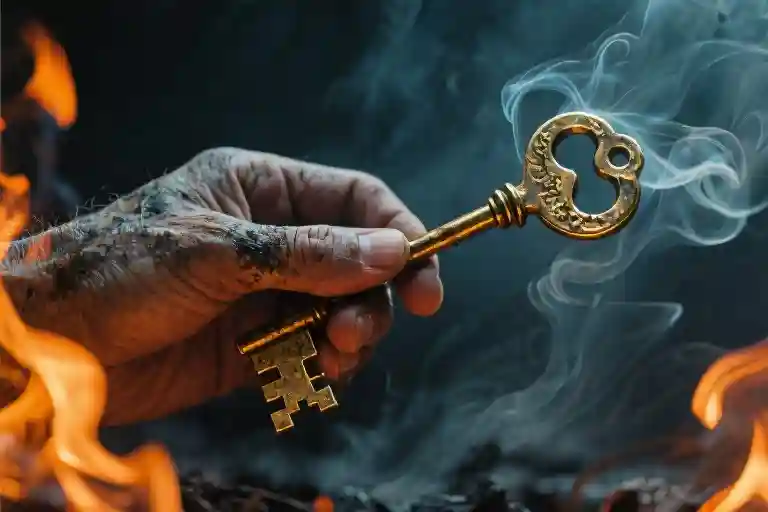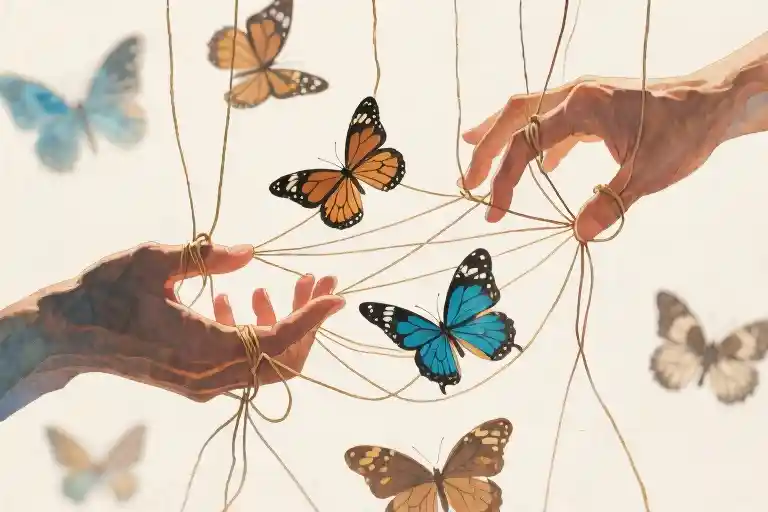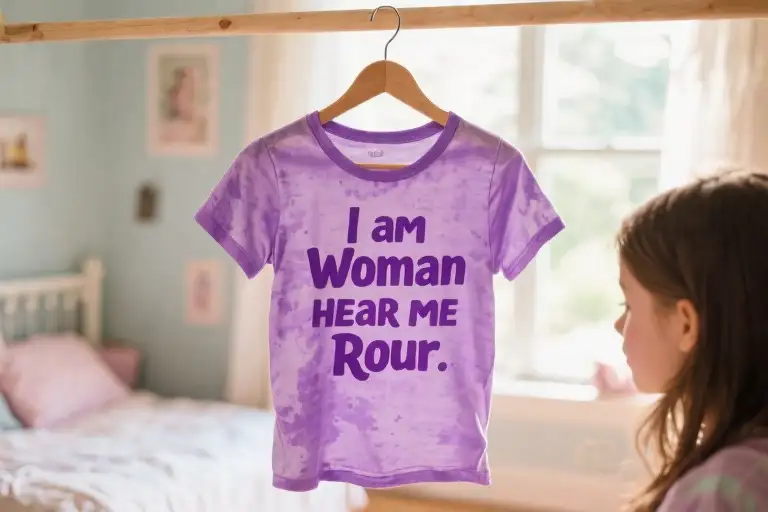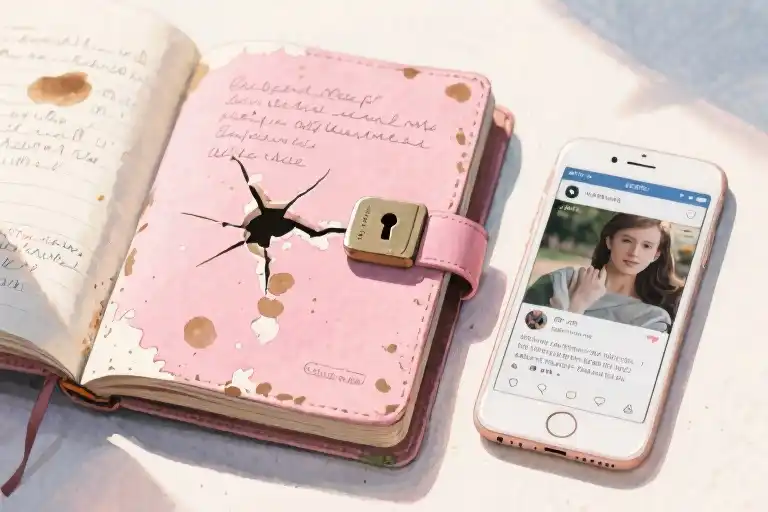You are both the prisoner and the jailer—aching for freedom yet bolting the door yourself. The air tastes of charred dreams in this house you can’t leave, its smoke curling around your ankles like chains. A set of unfamiliar keys presses into your palm, their teeth sharp enough to draw blood if you clenched hard enough. Every morning you test their weight, every night you return them to your pocket untouched.
The strangest part isn’t the heat creeping up the floorboards or the way the wallpaper peels like scorched skin. It’s how comfortably your feet have learned the grooves between burning planks, how your lungs have adjusted to breathing through the thickness of regret. You tell yourself you’re waiting—for a sign, for courage, for the flames to make the choice for you—but the truth stains your hands darker than soot: indecision is also a decision.
People mistake this for paralysis. They don’t understand how alive you are inside the burning, how vividly you feel each splinter of the dilemma. To stay means watching your reflection warp in the heat haze; to leave risks stepping into a blizzard with only the clothes on your back. Neither is just fear or desire—it’s the excruciating awareness of both pulsing through you like twin heartbeats.
The keys grow heavier each day. Not because the metal changes, but because you’re starting to recognize their shape. They fit doors you’ve been averting your eyes from—the career pivot whispered about during insomnia, the relationship that stopped feeding your soul years ago, the version of yourself you only admit to in bathroom mirrors at 3 AM.
Smoke stings your eyes as the fire reaches the family photos on the mantel. You could grab them still, if you moved now. But nostalgia makes poor kindling for a new life, and the future won’t wait for you to stop coughing up the past.
You’re Not Indecisive, You’re Split in Half
You scroll through job listings at midnight, bookmarking positions that promise something different—better pay, more purpose, a self you haven’t met yet. By morning, you decline the recruiter’s call. Your thumb hovers over the calendar invite for an interview, then swipes left to archive it. This isn’t hesitation. It’s civil war.
The paradox hums beneath your skin: you crave transformation like oxygen, yet cling to the familiar like a life raft. Social media algorithms feed you #NewBeginnings inspiration while your body rebels—palms sweating at the thought of updating your LinkedIn, stomach knotting when friends ask “So what’s next?” You’ve become fluent in the dialect of false starts, whispering “soon” to yourself like a lullaby.
Anchors and storms live in you simultaneously. You pray for hurricanes to wash you onto new shores while hammering chains into the ocean floor. The cognitive dissonance manifests physically—that tension headache behind your right eye, the way your jaw locks during another Monday morning commute. Your body keeps score of this silent struggle.
Change isn’t the enemy here. The real conflict lives in the liminal space between selves. Part of you still remembers how hard you fought for this current reality—the promotions earned through sleepless nights, the relationships nurtured through compromise. Walking away feels like erasing that version of you with a dry-erase marker, their struggles rendered temporary and therefore meaningless.
Yet another voice whispers truths you try to ignore: that the promotion came with chronic stress, that the compromises sanded down your edges. You’re caught between honoring your past investments and admitting they’ve stopped yielding returns. This isn’t analysis paralysis—it’s grief for a life that hasn’t ended yet, terror of a blank page that might reveal your handwriting has changed.
The keys jingle in your pocket. The door stands visible through the smoke. What no one prepares you for is how heavy doorknobs feel when they might lead both to salvation and to the realization that you waited too long to turn them.
The Burning House: A Metaphor for Change
The house isn’t collapsing yet, but you can smell the smoke curling under the doorframe. Your childhood photos still hang crooked on the hallway wall—that one from third grade where you’re missing a front tooth, the graduation portrait with overly gelled hair—all waiting to blacken and curl at the edges. These aren’t just images behind glass; they’re the artifacts of who you’ve believed yourself to be.
That’s the cruelest thing about necessary change: it always demands collateral damage. The keys in your palm aren’t some magical talisman. They’re heavier than they look, their teeth duller than you expected. You’ve turned them over a hundred times, memorizing every ridge, yet they’ve never quite fit the lock smoothly. There’s always resistance, always that metallic screech that makes your shoulders tense.
What nobody mentions about transformation is how ordinary its tools feel. You imagined trumpets or lightning strikes, but real change comes dressed in mundane moments:
- A Wednesday afternoon when you finally delete the draft resignation letter you’ve rewritten for eleven months
- The morning you stop saying “I’m fine” to your reflection
- That second where your hand hesitates before dialing the familiar number that always talks you out of leaving
The house keeps burning. Not dramatically, not in the way movies portray with roaring flames and heroic escapes. This fire licks slowly at baseboards, discoloring the walls you once painstakingly painted. You know every scorch mark by heart—that one by the stairs where you dropped a candle during your first dinner party, the charred spot near the fireplace where last winter’s log rolled out. These burns tell the story of a life lived, even if it’s a life that no longer fits.
And the keys? They’re not what you expected either. They don’t glow or hum with promise. They’re just cold metal shaped by someone else’s design. But here’s the secret no motivational poster shows: keys work better when your hand isn’t shaking. When you stop waiting for some mythical version of yourself—the fearless future you who’ll stride through fire without coughing—and just let your current singed, smoke-stung self turn the damn lock.
The photos will burn. The walls will char. The floors you danced on will collapse. But the air on the other side of that door? It’s already moving toward you, faint and sweet beneath the scent of burning things.
The Two Faces of Fear
Fear never arrives alone when change comes knocking. It brings its twin shadows—one whispering about the dangers ahead, the other mourning what you’ll leave behind. This isn’t just hesitation; it’s a civil war waged in your nervous system.
The first shadow stretches toward the future. Studies show we systematically overestimate the risks of change by 300%—our minds magnify potential failures while shrinking possible gains. That promotion you’re afraid to pursue? Your brain helpfully projects images of public humiliation. The relationship you consider leaving? Your imagination kindly supplies a montage of eternal loneliness. We don’t fear change itself; we fear the catastrophic stories we attach to it.
Then comes the second shadow, heavier and more insidious—the guilt of abandonment. That cubicle you hate? It witnessed your late-night breakthroughs. That toxic friendship? It sheltered you during last winter’s storm. Leaving means admitting some chapters were wrong turns, that years were spent building on shaky foundations. There’s quiet shame in realizing the life you’re fleeing is one you once fought to create.
These twin fears feed each other in cruel synergy. The unknown seems less terrifying when compared to betraying your past efforts. The sunk costs feel more justified when contrasted with imagined future disasters. You become the negotiator between two terrible options, bargaining with yourself in the hallway of a burning building—”Maybe the flames won’t reach the bedroom,” “Perhaps the smoke isn’t that thick yet.”
What makes this especially cruel is how familiarity distorts our perception. The devil you know always feels safer than the angel you don’t—even when the devil’s pitchfork is already poking your ribs. Psychologists call it the “endowment effect”: we assign irrational value to what’s already ours, including painful situations. That’s why people stay in dead-end jobs years after recognizing the dead end, why they nurse dying relationships long after the last pulse.
The keys in your hand grow heavier with this knowledge. Not because they’re actual metal, but because they represent the weight of dual realizations: that the future might disappoint, and that the past already has. This isn’t fear of change—it’s grief for the simpler times when you believed roads only forked between good and bad choices, before you understood most crossroads offer pain on all sides.
Yet here’s what your fear won’t tell you: staying also changes you. Every day spent in a burning house chars another piece of your courage. Each morning you ignore the keys steals a fraction of your self-trust. The status quo isn’t static—it’s slow erosion disguised as safety.
So when the twin shadows whisper their warnings tonight, ask them this: Are you truly afraid of what lies beyond the door—or have you just forgotten how brightly you can burn when not surrounded by flames?
The Smallest Signal of Change
There’s a peculiar cruelty in knowing exactly what needs to change while your hands refuse to move. You’ve analyzed the situation, traced the contours of your dissatisfaction, even visualized the door – yet your fingers won’t tighten around the knob. This paralysis isn’t ignorance; it’s the opposite. You see too clearly.
Consider this: write a letter to your former self that you’ll never send. Not some dramatic farewell, just simple words to the person you’re preparing to leave behind. Describe what they protected you from, what they could never give you, why you must part ways. Don’t polish it. Let the sentences stumble. The ink might smear from whatever’s welling up in your eyes – that’s part of the ritual.
We cling to familiar discomforts because our brains register change as threat. The neural pathways light up with the same signals as physical danger. That tightness in your chest when contemplating a career shift? Your primitive mind screaming that you’re stepping off a cliff. Except you’re not. You’re stepping out of a burning building.
Here’s the uncomfortable truth your hesitation reveals: by not choosing, you’re still making a choice. Every morning you hit snooze on your own transformation, you vote for the status quo. The house keeps burning while you debate whether the doorknob might be hot.
Try this mental recalibration: if your current ‘safety’ is actually an illusion – and it usually is – what are you truly losing by changing? List the concrete costs of staying put. The extra years in a soul-eroding job. The relationships that drain more than they give. The version of yourself that’s slowly being erased by compromise. Sometimes we need to hold both truths: what we fear losing and what we’re already forfeiting by standing still.
That unfamiliar weight in your pocket? Those are the keys. They’ve been there all along.
The Final Threshold
The smoke has reached the staircase now, curling around your ankles like a question you can no longer ignore. Those keys in your palm—once cold and unfamiliar—have grown warm with your indecision. Not hot enough to burn, but enough to remind you: every second spent staring at the door makes the metal harder to grasp.
This is the cruel mathematics of change. The fire doesn’t negotiate. Flames don’t pause to consider your childhood photos blackening on the walls or the way your favorite chair will collapse into embers. While you weigh the cost of leaving, the house keeps burning. While you mourn what might be lost, the viable exits grow fewer.
Here’s what nobody prepared you for: the moment of choosing won’t arrive with fanfare. No epiphany, no sudden courage. Just a quiet realization that staying has become more painful than the fear of going. The threshold between ‘before’ and ‘after’ isn’t a line—it’s a breath held too long in a smoke-filled room.
That version of you who breathes easier? They’re not some distant stranger. They’re who you become the instant your fingers stop trembling around the doorknob. The transformation isn’t in reaching some mythical better place—it’s in the act of turning the key itself. Every apology you won’t have to make tomorrow, every morning you’ll wake without dread, begins with this single motion.
Yet the floorboards still grip your feet. Because leaving means admitting the fire was never accidental. That you’ve been both arsonist and victim, poisoning the air while praying for a breeze. This house—broken, burning—still bears your fingerprints in the dust.
So here’s the only question left: When the last unburned room becomes unbearable, will you finally use those keys? Or will you keep cataloging reasons to stay until the doorknob blisters your skin?
The fire makes no promises. It might cleanse. It might destroy. But it will never, ever stop.





